Unit 10 Lending a Helping Hand Preparing for the Topic Function课件(共60张PPT,含内嵌视频)仁爱版(2024)七年级下册
文档属性
| 名称 | Unit 10 Lending a Helping Hand Preparing for the Topic Function课件(共60张PPT,含内嵌视频)仁爱版(2024)七年级下册 | 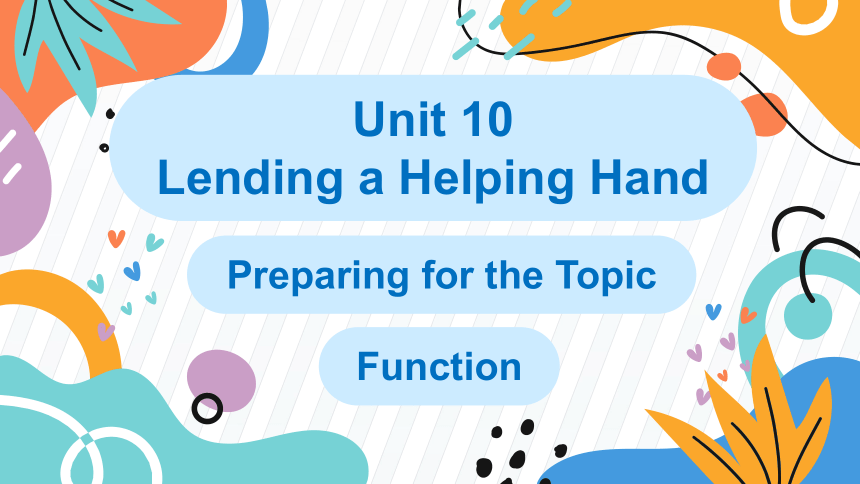 | |
| 格式 | pptx | ||
| 文件大小 | 69.5MB | ||
| 资源类型 | 教案 | ||
| 版本资源 | 仁爱科普版 | ||
| 科目 | 英语 | ||
| 更新时间 | 2025-05-25 19:36:18 | ||
图片预览

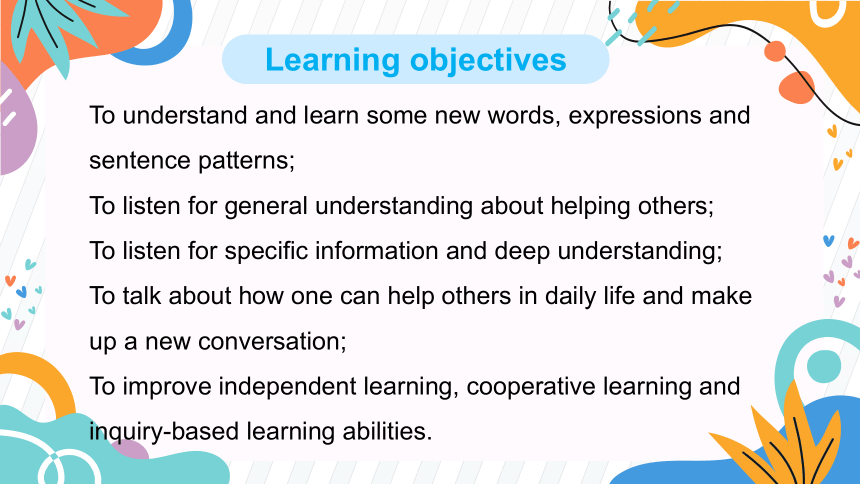
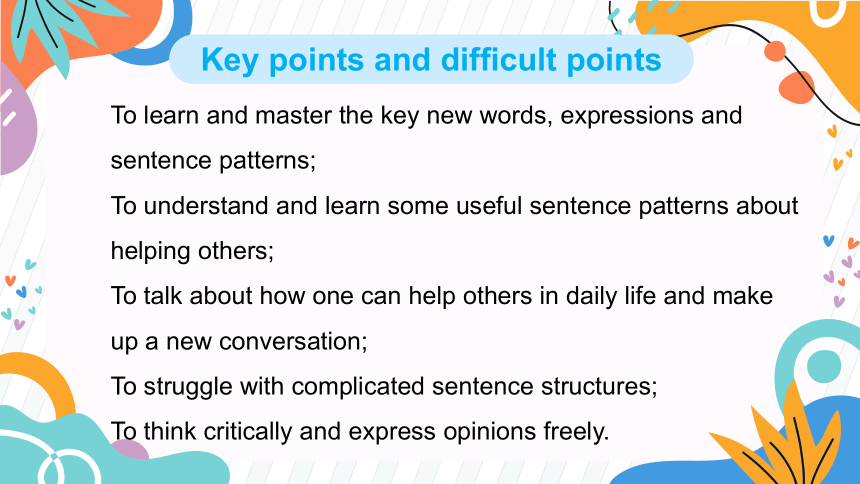

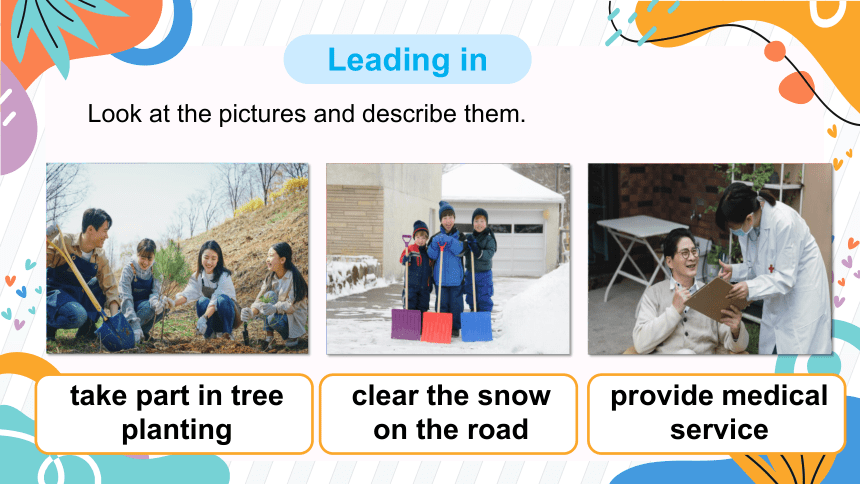
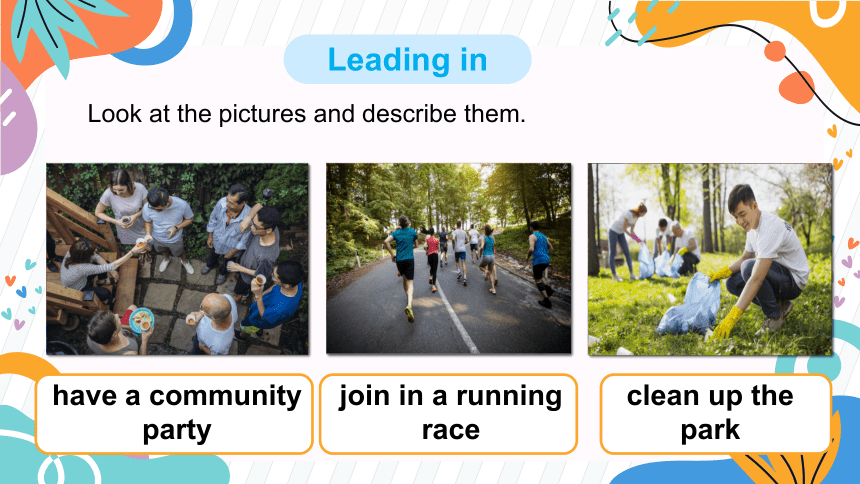
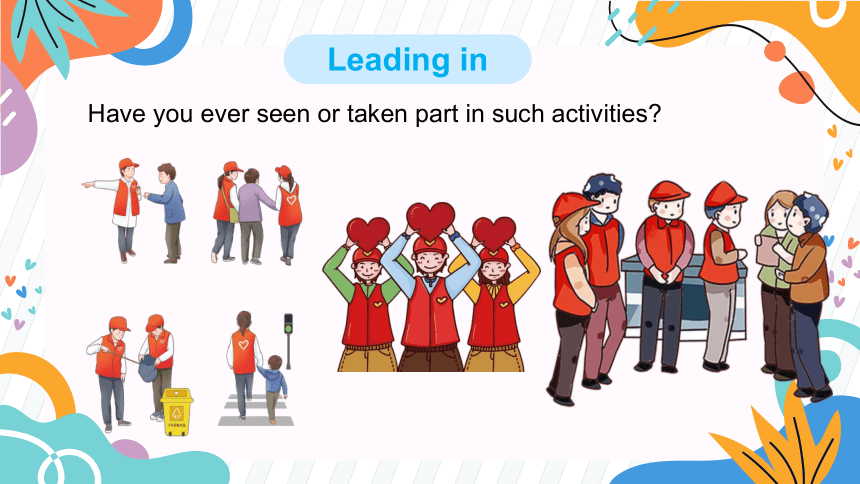
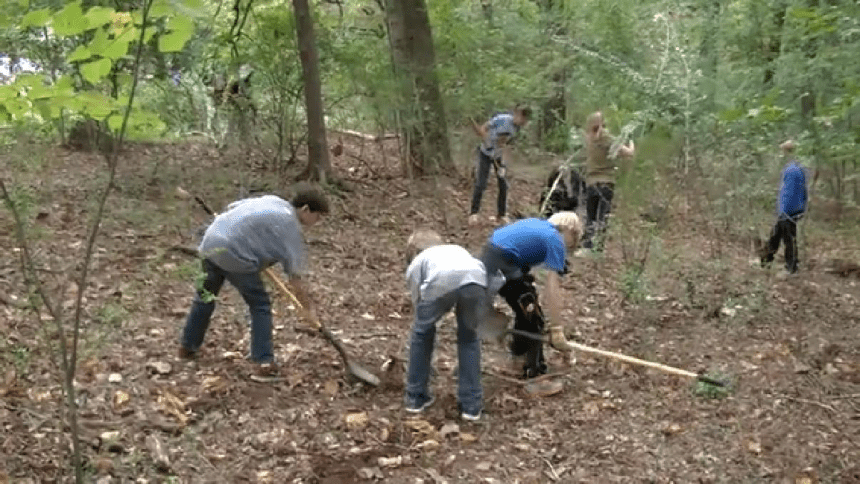
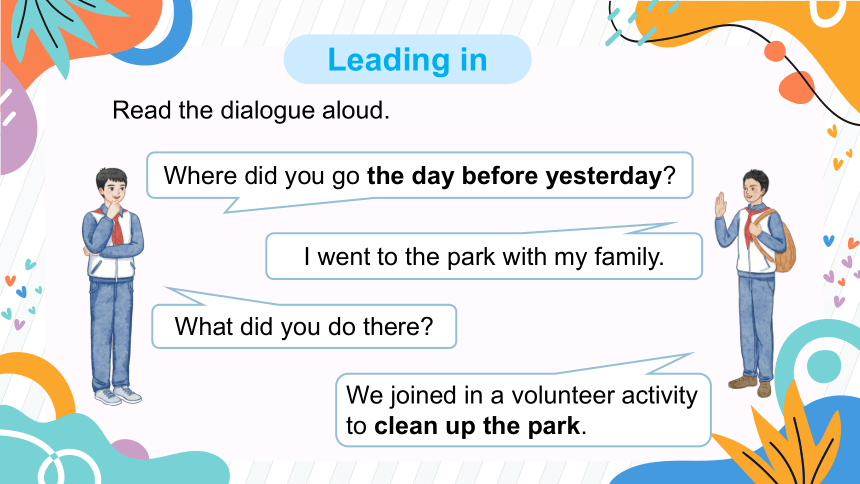

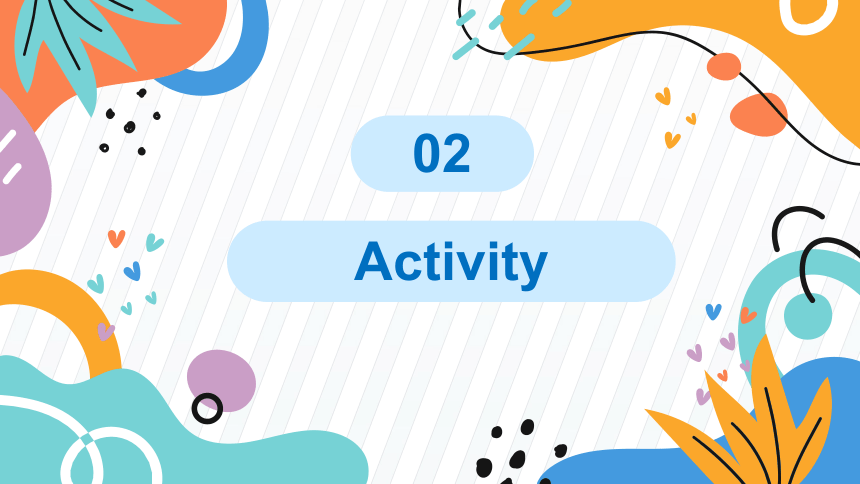

文档简介
(共60张PPT)
Preparing for the Topic
Function
Unit 10
Lending a Helping Hand
Learning objectives
To understand and learn some new words, expressions and sentence patterns;
To listen for general understanding about helping others;
To listen for specific information and deep understanding;
To talk about how one can help others in daily life and make up a new conversation;
To improve independent learning, cooperative learning and inquiry-based learning abilities.
Key points and difficult points
To learn and master the key new words, expressions and sentence patterns;
To understand and learn some useful sentence patterns about helping others;
To talk about how one can help others in daily life and make up a new conversation;
To struggle with complicated sentence structures;
To think critically and express opinions freely.
Leading in
01
Leading in
Look at the pictures and describe them.
take part in tree planting
clear the snow on the road
provide medical service
Leading in
Look at the pictures and describe them.
have a community party
join in a running race
clean up the park
Leading in
Have you ever seen or taken part in such activities
Leading in
Leading in
Read the dialogue aloud.
I went to the park with my family.
We joined in a volunteer activity to clean up the park.
Where did you go the day before yesterday
What did you do there
Leading in
Make your own dialogue in pairs.
I went to _______________________.
We joined in a volunteer activity to __________________.
Where did you go _______________________
What did you do there
Activity
02
Pair work. Talk about how you can help others in your daily life. Add more ideas in the blanks.
Activity 1
do voluntary work
...
share your experience
tell stories to children
water flowers
...
Pair work. Talk about how you can help others in your daily life. Add more ideas in the blanks.
Activity 1
The girl forgot her umbrella.
What can we do to help her
Offer her an umbrella.
Pair work. Talk about how you can help others in your daily life. Add more ideas in the blanks.
Activity 1
The plant is dying without water.
What can we do to help it
Water the plant.
Pair work. Talk about how you can help others in your daily life. Add more ideas in the blanks.
Activity 1
The park is covered in litter.
What can we do
Pick up the rubbish.
A. She lent her phone to Mrs. Li.
B. She opened the door for Mrs. Li.
C. She went shopping with Mrs. Li.
Listen to the conversation and answer the question.
Activity 2
√
What did Xiao Ya do for Mrs. Li
Listen and read, and then mark T (True) or F (False).
( ) 1. Mrs. Li lost her keys and her phone.
( ) 2. Xiao Ya called Mrs. Li's daughter. ( ) 3. Mrs. Li's daughter was coming back. ( ) 4. Xiao Ya asked Mrs. Li to wait at her home.
( ) 5. Mrs. Li asked Xiao Ya to help her do some shopping.
F
F
T
T
F
Activity 3
Listen again, and then correct the false sentences.
1. Mrs. Li lost her keys and her phone.
2. Xiao Ya called Mrs. Li's daughter. 3. Mrs. Li's daughter was coming back. 4. Xiao Ya asked Mrs. Li to wait at her home.
5. Mrs. Li asked Xiao Ya to help her do some shopping.
left
Mrs. Li
need to
Activity 3
Find out the phrases in the dialogue.
(Xiao Ya’s neighbor, Mrs. Li, knocks at the door, and Xiao Ya opens the door.)
Mrs. Li: Hi, Xiao Ya. Could you help me
Xiao Ya: Sure, Mrs. Li. What’s up
Mrs. Li: I left my keys and my phone at home. Now I can’t open the door. May I use your phone to call my daughter
Xiao Ya: Just a minute, please. Let me get my phone for you.
Activity 3
敲门
把……落下
开门
稍等一会儿
为……拿
Activity 3
(Two minutes later)
Mrs. Li: Thank you so much. Here is your phone.
Xiao Ya: You’re welcome. Is your daughter coming
Mrs. Li: Yes. She is on her way back now.
Xiao Ya: Great! Would you come in and wait for her at my home
Mrs. Li: Oh, that’s very kind of you, but I need to do some shopping. Thank you very much for your help.
Xiao Ya: That’s all right.
Find out the phrases in the dialogue.
在某人回来的路上
进来
等待
因某事 / 做某事而感谢某人
Activity 4
Suppose your neighbor lost his cat and you want to help him, and then make up a new conversation.
Activity 4
Suppose your neighbor lost his cat and you want to help him, and then make up a new conversation.
A: Hi, ... Could you help me
B: Of course, ... What’s the matter
A: ...
B: ...
A: ...
B: ...
A: Thank you very much for your help!
B: You’re welcome.
Activity 4
Suppose your neighbor lost his cat and you want to help him, and then make up a new conversation.
A: Hi, ... Could you help me
B: Sure, ... What's up
A: ...
B: ...
A: Thank you very much for your help. / Thank you so much.
B: That's OK. /That's all right./ You're welcome.
Vocabulary
03
单词 词性 释义
voluntary adj. 无偿的,义务性的;自愿的,
志愿的,主动的
experience n. 经历;经验;体验
v. 经历;体验
leave v. 忘了带,丢下;离开;遗弃
key n. 钥匙;关键
adj. 最重要的;关键的
daughter n. 女儿
lose v. 丢失;输掉(比赛等)
Vocabulary
Language points
04
Language points
1. share your experience
experience(1)此处作不可数名词,意为“经验”
She is a good teacher with a lot of experience.
她是一位富有经验的好老师。
(2)experience 的其他用法
① 可数名词,意为“经历”
A trip to Guilin is a wonderful experience.
去桂林的旅行是一次很棒的经历。
Language points
1. share your experience
(2)experience 的其他用法
② 动词,意为“经历;经受;遭受;体验”
They had the chance to experience life at sea.
他们有机会体验海上生活。
You will experience pain I can't even describe.
你会遭受到无法描述的疼痛。
It can experience the trail of time.
它能经受时间的考验。
Language points
2. Could you help me
委婉请求帮助,比 “Can you help me ” 更礼貌
同义表达:① Would you mind helping me
② May I ask for your help
- Could you help me carry the box
你能帮我办一下箱子吗?
- Sure, no problem. 当然可以,没问题。
Would you mind helping me with this problem
你愿意帮我解决一下这个问题吗?
Language points
3. - What's up
- I left my keys and my phone at home.
(1)“What's up ”意为“怎么了?”常用于口语,用来询问对方有什么事情,相当于“What's wrong ”。后面可接 with sb. / sth.,表示“某人或某事物怎么了 ”
- What's up 怎么了
- I lost my purse and didn' t have the money to pay for the food.
我钱包丢了,没有付食物的钱。
Language points
3. - What's up
- I left my keys and my phone at home.
(2)leave,1)动词,意为“忘了带,丢下”
① leave sth. / sb. + 地点状语,意为“把某物/某人遗忘在某处”
I left my phone at home.
我把手机落在家里了。
She left her bag in the car. 她把包落在车里了。
Don’t leave your phone on the table!
别把手机放桌上!
Language points
3. - What's up
- I left my keys and my phone at home.
② leave sth./sb. behind 意为“把某物/某人落下”
They left the rubbish behind. 他们留下了垃圾。
2)leave 作动词时的其他意思
① 离开(某人或某处)
It's a long time since they left. 他们已经离开很久了。
In two months, we will leave England.
两个月后,我们将离开英国。
Language points
3. - What's up
- I left my keys and my phone at home.
2)leave 作动词时的其他意思
② 遗弃
No one wanted me. They just left me there.
没人愿意收留我,我被遗弃了。
I'll never leave you. 我将对你不离不弃。
③ 剩余;余下
Seven from ten leaves three. 10减7等于3。
Language points
3. - What's up
- I left my keys and my phone at home.
(3)key,1)名词,意为“钥匙;关键;答案”,复数为 keys
I can't think where I put the keys.
我想不起把钥匙放哪儿了。
2)意为“用键盘输入;键入”
I'm busy keying data. 我正忙着录入数据。
Brian tried to key in his personal code.
布赖恩试着键入了他的个人密码。
Language points
3. - What's up
- I left my keys and my phone at home.
3)常用短语
① a set of keys 一串钥匙
Excuse me, did you see a set of keys
你好,你看到一串钥匙了吗?
② the key to... ……的钥匙 / ……的关键
The key to success is preparation. 成功的关键是准备。
This is the key to my room. 这是我房间的钥匙。
Language points
4. May l use your phone to call my daughter
call(1)动词,意为“(给……)打电话”
call sb. 意为“给某人打电话”
You can call me at any time if you are free.
如果你有时间,可以随时给我打电话。
(2)call 的相关搭配
① call + 电话号码 拨打……(号码)
Call 1234567 and we'll try and make a date.
拔打1234567,我们争取定个见面时间。
Language points
4. May l use your phone to call my daughter
(2)call 的相关搭配
② call sb. at+电话号码 拨打……(号码)找某人
You can call me at 1234567 if you have any problems.
你如果还有问题,可以拨1234567找我。
③ call back 回电话
I'll call back at a more convenient time.
在方便的时候我会回电话的。
Could you call back later 请稍后再打电话好吗?
Language points
4. May l use your phone to call my daughter
(3)call 的其他用法
① 动词,意为“把……叫作;称呼”
His friends call him Kangkang. (作动词)
他的朋友叫他康康。
② 名词,意为“打电话;通话”
There's a call for you! 有一通你的电话!
I'm expecting a call on this phone.
我正在等一通电话。
Language points
4. May l use your phone to call my daughter
(4)call 的相关短语
① make a call (to sb.) (给某人)打电话
Could you make a call to the manager for me
你可以为我打电话给经理吗?
② give sb. a call 给某人打电话
Let's catch up this weekend—give me a call when you're free!
周末聚聚吧,有空给我打电话!
Language points
5. Just a minute, please.
just a minute 意为“等一下”,常用于日常交际用语中,相当于wait a moment / second/ minute
- Xixi, hurry up! We are late for school.
西西,快点!我们上学要迟到了。
- Just a minute, please. 请等一下。
She is busy now, please wait a moment.
她正在忙,请稍等一会儿。
Wait a minute, it can't be right. 且慢,那不可能是对的。
Language points
6. Let me get my phone for you.
(1)get sth. for sb. 意为“为某人拿某物”,可与 get sb. sth. 互换
I got some flowers for my mother today.
=I got my mother some flowers today.
我今天给我妈妈拿了一些花儿。
(2) get 的相关短语
① get on 上车
We should line up to get on the bus. 我们应该排队上车。
Language points
6. Let me get my phone for you.
(2) get 的相关短语
② get off 下车
We should get off at the next stop.
我们应该在下一站下车。
③ get out of 离开(某地);从……出来
To keep healthy, you should got out of the house and exercise more.
为了保持健康,你应该多到户外锻炼。
Language points
6. Let me get my phone for you.
(2) get 的相关短语
④ get along with sb. 与某人和睦相处
I like to think I'm relatively easy to get along with.
我愿意认为自己相对比较容易相处。
⑤ get back 返回;回去
I'll get back home in September from Beijing.
我将在九月份从北京回家。
I need to get back home. 我需要回家。
Language points
7. Is your daughter coming
be coming 意为“要来了”,现在进行时表示将来的意义。在英语中有一些表示位移的动词,如 arrive、come、fly、go、leave、move、meet等,都可用现在进行时表示将来
We are coming! 我们来了!
At what time will you be arriving
你将在什么时间到达?
They are leaving for England next month.
他们下个月将动身去英国。
Language points
8. She is on her way back now.
on one's way to... 意为“在去……的路上、;在行进中”。其中 one's要与句子的主语在人称和数上保持一致,即必须是与主语相对应的形容词性物主代词
He is on his way to school. 他在上学的路上。
on one's way to... 若后接 here、there、home 等地点副词时,则不加介词 to
On my way home, l met Mr. Li.
我在回家的路上遇见了李老师。
Language points
9. Would you come in and wait for her at my home
Would you... (你愿意…… 吗?)
礼貌提出邀请或建议,比 “Will you... ” 更委婉。还可以说 Would you like to...
回答:肯定回答用 “Yes, I’d love to.”
否定回答用 “I’d love to, but...”
- Would you like to join the community activity with us
你愿意和我们一起参加社区活动吗?
- Yes, I’d love to. 是的,我愿意。
Language points
10. Oh, that's very kind of you, but I need to do some shopping.
kind (1)在此处作形容词,意为“友好的;体贴的;慈祥的”
Time is a kind friend. 时间是一位友善的朋友。
(2)辨析 be kind to sb. 和 be kind of sb.
① be kind to sb. 对……友好,侧重描述对某人的态度或行为
Mr. Geng is kind to us. 耿老师对我们很好。
The woman doctor is kind to every patient.
那位女医生对每一位病人都很和善。
Language points
10. Oh, that's very kind of you, but I need to do some shopping.
(2)辨析 be kind to sb. 和 be kind of sb.
② be kind of sb. 对某人友好,侧重描述人的品质
It is kind of you to help me. 您能帮助我,真是太好了。
That's/lt's very kind of you to help me learn English.
你帮助我学英语真是太好了。
That is very kind of you both. I would like to come
你们两位真是太客气了。我会来的。
Language points
10. Oh, that's very kind of you, but I need to do some shopping.
(3)kind 还可作名词,意为“种类”
a kind of 一种 different kinds of 不同种类的
all kinds of 各种各样的 many kinds of 许多种类的
l like eating different kinds of vegetables.
我喜欢吃不同种类的食物。
There are many kinds of clothes in the store.
这个店里有许多种类的衣服。
Exercise
05
Exercise
1. 这一工作无需相关的经验。
No previous ________________ is necessary for this job.
2. 我离开的时候他们都还在努力工作。
When I ____________, they were all still hard at it.
3. 我把钥匙给你,你可以自己开门进去。
I'll give you a _____________ so that you can let yourself in.
4. 我给你打电话了,可是怎么也打不通。
I tried to ____________ you but I couldn't get through.
experience
left
key
call
Exercise
5. 不管什么时候来,都请你先给我打个电话。
___________________ first no matter when you come.
6. 成功的关键在于从一开始就要准备充分。
________________ success is to be ready from the start.
7. 我需要从工作中抽身一段时间去体验人生。
I needed some time off from work to ________________ life.
8. 能麻烦你帮我把这些卡片整理一下吗?
_________________________________ sort out these cards
Give me a call
The key to
experience
Would you mind helping me
Exercise
9. 等一下,我看看她是不是在这儿。
____________________, I'll see if she's here.
10. 你不如试图与它们和睦相处。
You might as well try to ___________________ them.
11. 如果在我回来之前有人来,就请他等一等。
If anyone comes in before I ____________, ask them to wait.
12. 他做各种各样的活计来谋生。
He earns his living doing _________________ things.
Just a minute
get on with
get back
all kinds of
Exercise
13. 我回家时顺便要去药店一趟。
I'll call in at the chemist's _______________________.
14. 那位女老师对班上的每一位同学都很和善。
The woman teacher ____________ every student in her class.
15. 请稍等一下,我马上就到。
_____________________ please, I'll be right there.
16. 周末有很多种类的电影可以看。
There are ___________________ movies to see on weekends.
on my way home
is kind to
Wait a moment
many kinds of
Summary
06
Summary
Learn and master some new words, expressions and sentence patterns;
Listen for general understanding about helping others;
Listen for specific information and deep understanding;
Talk about how one can help others in daily life and make up a new conversation;
Think critically and express opinions freely.
Homework
07
Homework
Must-do: Review the key words, expressions and sentence patterns in today’s lesson.
Choose-to-do: Write down your experience about helping others.
Thank you
Preparing for the Topic
Function
Unit 10
Lending a Helping Hand
Learning objectives
To understand and learn some new words, expressions and sentence patterns;
To listen for general understanding about helping others;
To listen for specific information and deep understanding;
To talk about how one can help others in daily life and make up a new conversation;
To improve independent learning, cooperative learning and inquiry-based learning abilities.
Key points and difficult points
To learn and master the key new words, expressions and sentence patterns;
To understand and learn some useful sentence patterns about helping others;
To talk about how one can help others in daily life and make up a new conversation;
To struggle with complicated sentence structures;
To think critically and express opinions freely.
Leading in
01
Leading in
Look at the pictures and describe them.
take part in tree planting
clear the snow on the road
provide medical service
Leading in
Look at the pictures and describe them.
have a community party
join in a running race
clean up the park
Leading in
Have you ever seen or taken part in such activities
Leading in
Leading in
Read the dialogue aloud.
I went to the park with my family.
We joined in a volunteer activity to clean up the park.
Where did you go the day before yesterday
What did you do there
Leading in
Make your own dialogue in pairs.
I went to _______________________.
We joined in a volunteer activity to __________________.
Where did you go _______________________
What did you do there
Activity
02
Pair work. Talk about how you can help others in your daily life. Add more ideas in the blanks.
Activity 1
do voluntary work
...
share your experience
tell stories to children
water flowers
...
Pair work. Talk about how you can help others in your daily life. Add more ideas in the blanks.
Activity 1
The girl forgot her umbrella.
What can we do to help her
Offer her an umbrella.
Pair work. Talk about how you can help others in your daily life. Add more ideas in the blanks.
Activity 1
The plant is dying without water.
What can we do to help it
Water the plant.
Pair work. Talk about how you can help others in your daily life. Add more ideas in the blanks.
Activity 1
The park is covered in litter.
What can we do
Pick up the rubbish.
A. She lent her phone to Mrs. Li.
B. She opened the door for Mrs. Li.
C. She went shopping with Mrs. Li.
Listen to the conversation and answer the question.
Activity 2
√
What did Xiao Ya do for Mrs. Li
Listen and read, and then mark T (True) or F (False).
( ) 1. Mrs. Li lost her keys and her phone.
( ) 2. Xiao Ya called Mrs. Li's daughter. ( ) 3. Mrs. Li's daughter was coming back. ( ) 4. Xiao Ya asked Mrs. Li to wait at her home.
( ) 5. Mrs. Li asked Xiao Ya to help her do some shopping.
F
F
T
T
F
Activity 3
Listen again, and then correct the false sentences.
1. Mrs. Li lost her keys and her phone.
2. Xiao Ya called Mrs. Li's daughter. 3. Mrs. Li's daughter was coming back. 4. Xiao Ya asked Mrs. Li to wait at her home.
5. Mrs. Li asked Xiao Ya to help her do some shopping.
left
Mrs. Li
need to
Activity 3
Find out the phrases in the dialogue.
(Xiao Ya’s neighbor, Mrs. Li, knocks at the door, and Xiao Ya opens the door.)
Mrs. Li: Hi, Xiao Ya. Could you help me
Xiao Ya: Sure, Mrs. Li. What’s up
Mrs. Li: I left my keys and my phone at home. Now I can’t open the door. May I use your phone to call my daughter
Xiao Ya: Just a minute, please. Let me get my phone for you.
Activity 3
敲门
把……落下
开门
稍等一会儿
为……拿
Activity 3
(Two minutes later)
Mrs. Li: Thank you so much. Here is your phone.
Xiao Ya: You’re welcome. Is your daughter coming
Mrs. Li: Yes. She is on her way back now.
Xiao Ya: Great! Would you come in and wait for her at my home
Mrs. Li: Oh, that’s very kind of you, but I need to do some shopping. Thank you very much for your help.
Xiao Ya: That’s all right.
Find out the phrases in the dialogue.
在某人回来的路上
进来
等待
因某事 / 做某事而感谢某人
Activity 4
Suppose your neighbor lost his cat and you want to help him, and then make up a new conversation.
Activity 4
Suppose your neighbor lost his cat and you want to help him, and then make up a new conversation.
A: Hi, ... Could you help me
B: Of course, ... What’s the matter
A: ...
B: ...
A: ...
B: ...
A: Thank you very much for your help!
B: You’re welcome.
Activity 4
Suppose your neighbor lost his cat and you want to help him, and then make up a new conversation.
A: Hi, ... Could you help me
B: Sure, ... What's up
A: ...
B: ...
A: Thank you very much for your help. / Thank you so much.
B: That's OK. /That's all right./ You're welcome.
Vocabulary
03
单词 词性 释义
voluntary adj. 无偿的,义务性的;自愿的,
志愿的,主动的
experience n. 经历;经验;体验
v. 经历;体验
leave v. 忘了带,丢下;离开;遗弃
key n. 钥匙;关键
adj. 最重要的;关键的
daughter n. 女儿
lose v. 丢失;输掉(比赛等)
Vocabulary
Language points
04
Language points
1. share your experience
experience(1)此处作不可数名词,意为“经验”
She is a good teacher with a lot of experience.
她是一位富有经验的好老师。
(2)experience 的其他用法
① 可数名词,意为“经历”
A trip to Guilin is a wonderful experience.
去桂林的旅行是一次很棒的经历。
Language points
1. share your experience
(2)experience 的其他用法
② 动词,意为“经历;经受;遭受;体验”
They had the chance to experience life at sea.
他们有机会体验海上生活。
You will experience pain I can't even describe.
你会遭受到无法描述的疼痛。
It can experience the trail of time.
它能经受时间的考验。
Language points
2. Could you help me
委婉请求帮助,比 “Can you help me ” 更礼貌
同义表达:① Would you mind helping me
② May I ask for your help
- Could you help me carry the box
你能帮我办一下箱子吗?
- Sure, no problem. 当然可以,没问题。
Would you mind helping me with this problem
你愿意帮我解决一下这个问题吗?
Language points
3. - What's up
- I left my keys and my phone at home.
(1)“What's up ”意为“怎么了?”常用于口语,用来询问对方有什么事情,相当于“What's wrong ”。后面可接 with sb. / sth.,表示“某人或某事物怎么了 ”
- What's up 怎么了
- I lost my purse and didn' t have the money to pay for the food.
我钱包丢了,没有付食物的钱。
Language points
3. - What's up
- I left my keys and my phone at home.
(2)leave,1)动词,意为“忘了带,丢下”
① leave sth. / sb. + 地点状语,意为“把某物/某人遗忘在某处”
I left my phone at home.
我把手机落在家里了。
She left her bag in the car. 她把包落在车里了。
Don’t leave your phone on the table!
别把手机放桌上!
Language points
3. - What's up
- I left my keys and my phone at home.
② leave sth./sb. behind 意为“把某物/某人落下”
They left the rubbish behind. 他们留下了垃圾。
2)leave 作动词时的其他意思
① 离开(某人或某处)
It's a long time since they left. 他们已经离开很久了。
In two months, we will leave England.
两个月后,我们将离开英国。
Language points
3. - What's up
- I left my keys and my phone at home.
2)leave 作动词时的其他意思
② 遗弃
No one wanted me. They just left me there.
没人愿意收留我,我被遗弃了。
I'll never leave you. 我将对你不离不弃。
③ 剩余;余下
Seven from ten leaves three. 10减7等于3。
Language points
3. - What's up
- I left my keys and my phone at home.
(3)key,1)名词,意为“钥匙;关键;答案”,复数为 keys
I can't think where I put the keys.
我想不起把钥匙放哪儿了。
2)意为“用键盘输入;键入”
I'm busy keying data. 我正忙着录入数据。
Brian tried to key in his personal code.
布赖恩试着键入了他的个人密码。
Language points
3. - What's up
- I left my keys and my phone at home.
3)常用短语
① a set of keys 一串钥匙
Excuse me, did you see a set of keys
你好,你看到一串钥匙了吗?
② the key to... ……的钥匙 / ……的关键
The key to success is preparation. 成功的关键是准备。
This is the key to my room. 这是我房间的钥匙。
Language points
4. May l use your phone to call my daughter
call(1)动词,意为“(给……)打电话”
call sb. 意为“给某人打电话”
You can call me at any time if you are free.
如果你有时间,可以随时给我打电话。
(2)call 的相关搭配
① call + 电话号码 拨打……(号码)
Call 1234567 and we'll try and make a date.
拔打1234567,我们争取定个见面时间。
Language points
4. May l use your phone to call my daughter
(2)call 的相关搭配
② call sb. at+电话号码 拨打……(号码)找某人
You can call me at 1234567 if you have any problems.
你如果还有问题,可以拨1234567找我。
③ call back 回电话
I'll call back at a more convenient time.
在方便的时候我会回电话的。
Could you call back later 请稍后再打电话好吗?
Language points
4. May l use your phone to call my daughter
(3)call 的其他用法
① 动词,意为“把……叫作;称呼”
His friends call him Kangkang. (作动词)
他的朋友叫他康康。
② 名词,意为“打电话;通话”
There's a call for you! 有一通你的电话!
I'm expecting a call on this phone.
我正在等一通电话。
Language points
4. May l use your phone to call my daughter
(4)call 的相关短语
① make a call (to sb.) (给某人)打电话
Could you make a call to the manager for me
你可以为我打电话给经理吗?
② give sb. a call 给某人打电话
Let's catch up this weekend—give me a call when you're free!
周末聚聚吧,有空给我打电话!
Language points
5. Just a minute, please.
just a minute 意为“等一下”,常用于日常交际用语中,相当于wait a moment / second/ minute
- Xixi, hurry up! We are late for school.
西西,快点!我们上学要迟到了。
- Just a minute, please. 请等一下。
She is busy now, please wait a moment.
她正在忙,请稍等一会儿。
Wait a minute, it can't be right. 且慢,那不可能是对的。
Language points
6. Let me get my phone for you.
(1)get sth. for sb. 意为“为某人拿某物”,可与 get sb. sth. 互换
I got some flowers for my mother today.
=I got my mother some flowers today.
我今天给我妈妈拿了一些花儿。
(2) get 的相关短语
① get on 上车
We should line up to get on the bus. 我们应该排队上车。
Language points
6. Let me get my phone for you.
(2) get 的相关短语
② get off 下车
We should get off at the next stop.
我们应该在下一站下车。
③ get out of 离开(某地);从……出来
To keep healthy, you should got out of the house and exercise more.
为了保持健康,你应该多到户外锻炼。
Language points
6. Let me get my phone for you.
(2) get 的相关短语
④ get along with sb. 与某人和睦相处
I like to think I'm relatively easy to get along with.
我愿意认为自己相对比较容易相处。
⑤ get back 返回;回去
I'll get back home in September from Beijing.
我将在九月份从北京回家。
I need to get back home. 我需要回家。
Language points
7. Is your daughter coming
be coming 意为“要来了”,现在进行时表示将来的意义。在英语中有一些表示位移的动词,如 arrive、come、fly、go、leave、move、meet等,都可用现在进行时表示将来
We are coming! 我们来了!
At what time will you be arriving
你将在什么时间到达?
They are leaving for England next month.
他们下个月将动身去英国。
Language points
8. She is on her way back now.
on one's way to... 意为“在去……的路上、;在行进中”。其中 one's要与句子的主语在人称和数上保持一致,即必须是与主语相对应的形容词性物主代词
He is on his way to school. 他在上学的路上。
on one's way to... 若后接 here、there、home 等地点副词时,则不加介词 to
On my way home, l met Mr. Li.
我在回家的路上遇见了李老师。
Language points
9. Would you come in and wait for her at my home
Would you... (你愿意…… 吗?)
礼貌提出邀请或建议,比 “Will you... ” 更委婉。还可以说 Would you like to...
回答:肯定回答用 “Yes, I’d love to.”
否定回答用 “I’d love to, but...”
- Would you like to join the community activity with us
你愿意和我们一起参加社区活动吗?
- Yes, I’d love to. 是的,我愿意。
Language points
10. Oh, that's very kind of you, but I need to do some shopping.
kind (1)在此处作形容词,意为“友好的;体贴的;慈祥的”
Time is a kind friend. 时间是一位友善的朋友。
(2)辨析 be kind to sb. 和 be kind of sb.
① be kind to sb. 对……友好,侧重描述对某人的态度或行为
Mr. Geng is kind to us. 耿老师对我们很好。
The woman doctor is kind to every patient.
那位女医生对每一位病人都很和善。
Language points
10. Oh, that's very kind of you, but I need to do some shopping.
(2)辨析 be kind to sb. 和 be kind of sb.
② be kind of sb. 对某人友好,侧重描述人的品质
It is kind of you to help me. 您能帮助我,真是太好了。
That's/lt's very kind of you to help me learn English.
你帮助我学英语真是太好了。
That is very kind of you both. I would like to come
你们两位真是太客气了。我会来的。
Language points
10. Oh, that's very kind of you, but I need to do some shopping.
(3)kind 还可作名词,意为“种类”
a kind of 一种 different kinds of 不同种类的
all kinds of 各种各样的 many kinds of 许多种类的
l like eating different kinds of vegetables.
我喜欢吃不同种类的食物。
There are many kinds of clothes in the store.
这个店里有许多种类的衣服。
Exercise
05
Exercise
1. 这一工作无需相关的经验。
No previous ________________ is necessary for this job.
2. 我离开的时候他们都还在努力工作。
When I ____________, they were all still hard at it.
3. 我把钥匙给你,你可以自己开门进去。
I'll give you a _____________ so that you can let yourself in.
4. 我给你打电话了,可是怎么也打不通。
I tried to ____________ you but I couldn't get through.
experience
left
key
call
Exercise
5. 不管什么时候来,都请你先给我打个电话。
___________________ first no matter when you come.
6. 成功的关键在于从一开始就要准备充分。
________________ success is to be ready from the start.
7. 我需要从工作中抽身一段时间去体验人生。
I needed some time off from work to ________________ life.
8. 能麻烦你帮我把这些卡片整理一下吗?
_________________________________ sort out these cards
Give me a call
The key to
experience
Would you mind helping me
Exercise
9. 等一下,我看看她是不是在这儿。
____________________, I'll see if she's here.
10. 你不如试图与它们和睦相处。
You might as well try to ___________________ them.
11. 如果在我回来之前有人来,就请他等一等。
If anyone comes in before I ____________, ask them to wait.
12. 他做各种各样的活计来谋生。
He earns his living doing _________________ things.
Just a minute
get on with
get back
all kinds of
Exercise
13. 我回家时顺便要去药店一趟。
I'll call in at the chemist's _______________________.
14. 那位女老师对班上的每一位同学都很和善。
The woman teacher ____________ every student in her class.
15. 请稍等一下,我马上就到。
_____________________ please, I'll be right there.
16. 周末有很多种类的电影可以看。
There are ___________________ movies to see on weekends.
on my way home
is kind to
Wait a moment
many kinds of
Summary
06
Summary
Learn and master some new words, expressions and sentence patterns;
Listen for general understanding about helping others;
Listen for specific information and deep understanding;
Talk about how one can help others in daily life and make up a new conversation;
Think critically and express opinions freely.
Homework
07
Homework
Must-do: Review the key words, expressions and sentence patterns in today’s lesson.
Choose-to-do: Write down your experience about helping others.
Thank you
同课章节目录
